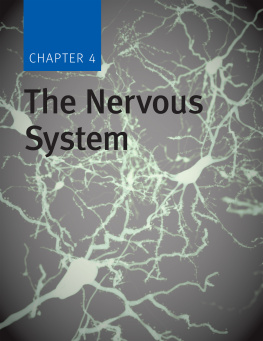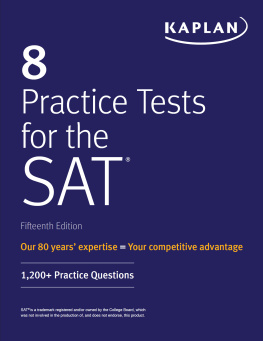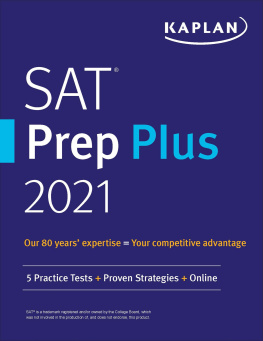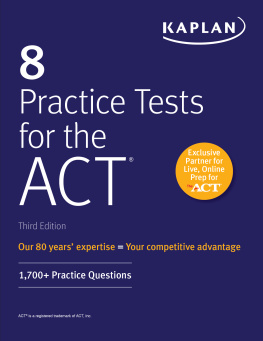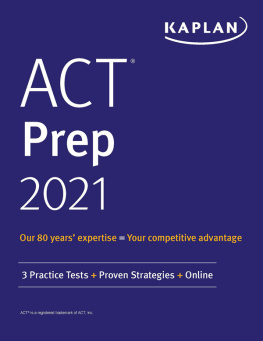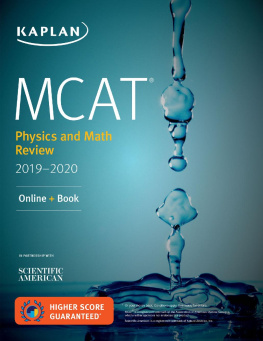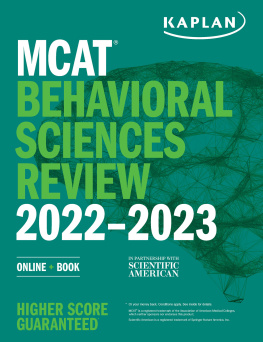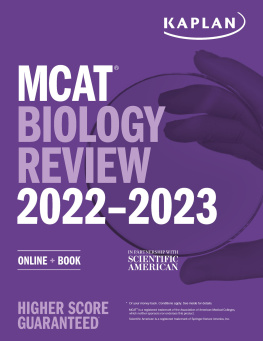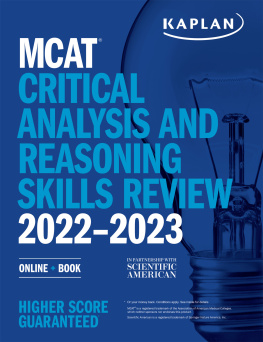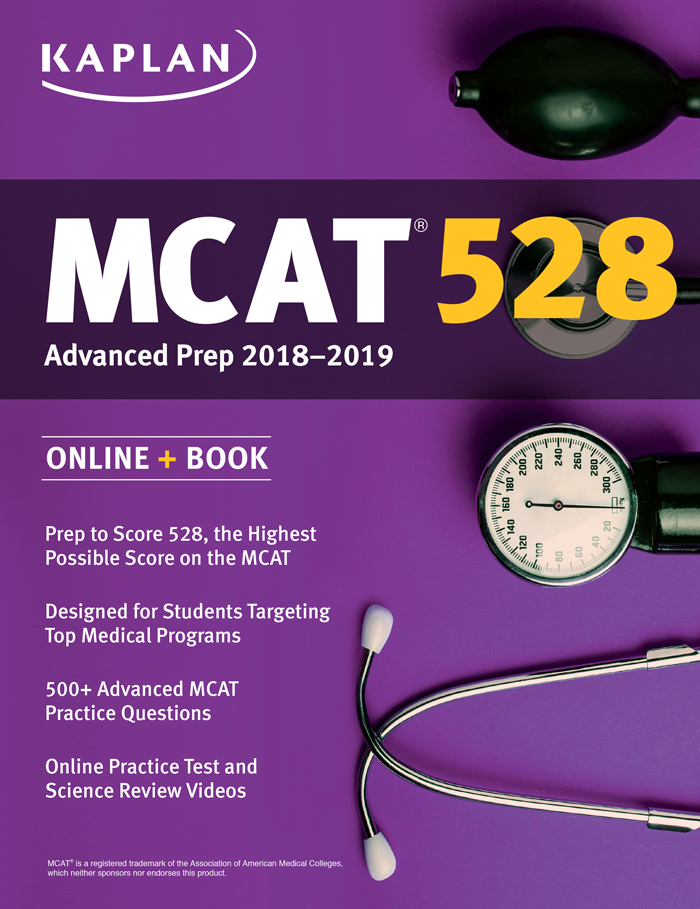Contents
MCAT
Advanced Prep for Advanced Students
20182019
Edited by Deeangelee Pooran-Kublall, MD/MPH

MCAT is a registered trademark of the Association of American Medical Colleges, which neither sponsors nor endorses this product.
This publication is designed to provide accurate information in regard to the subject matter covered as of its publication date, with the understanding that knowledge and best practice constantly evolve. The publisher is not engaged in rendering medical, legal, accounting, or other professional service. If medical or legal advice or other expert assistance is required, the services of a competent professional should be sought. This publication is not intended for use in clinical practice or the delivery of medical care. To the fullest extent of the law, neither the Publisher nor the Editors assume any liability for any injury and/or damage to persons or property arising out of or related to any use of the material contained in this book.
2017 by Kaplan, Inc.
Published by Kaplan Publishing, a division of Kaplan, Inc.
750 Third Avenue
New York, NY 10017
All rights reserved. The text of this publication, or any part thereof, may not be reproduced in any manner whatsoever without written permission from the publisher.
10 9 8 7 6 5 4 3 2 1
ISBN: 978-1-5062-2370-4
Kaplan Publishing print books are available at special quantity discounts to use for sales promotions, employee premiums, or educational purposes. For more information or to purchase books, please call the Simon & Schuster special sales department at 866-506-1949.
Contents
The Kaplan MCAT 528 Team
Deeangelee Pooran-Kublall, MD/MPH Editor-in-Chief |
Christopher Durland Kaplan MCAT Faculty, Editor | Matthew Dominick Eggert Kaplan MCAT Faculty, Author |
Samer T. Ismail Kaplan MCAT Faculty, Author/Editor | Thomas C. C. Sargent II Kaplan MCAT Faculty, Author |
Laura Ambler Kaplan MCAT Faculty, Author |
MCAT faculty writers/contributors: Marilyn Engel, Elizabeth Flagge, Jason Pfleiger, Uneeb Qureshi, Neha Rao, Charles Richards, Noah Silva, and Rebecca Stover.
Countless thanks to Kim Bowers; Eric Chiu; Samantha Fallon; Owen Farcy; Dan Frey; Robin Garmise; Rita Garthaffner; Joanna Graham; Adam Grey; Allison Harm; Alex Macnow, MD; Aaron Lemon-Strauss; Keith Lubeley; Petros Minasi; John Polstein; Rochelle Rothstein, MD; Larry Rudman; Sylvia Tidwell Scheuring; Carly Schnur; Lee Weiss; and many others who made this project possible.
About the MCAT
The structure of the four sections of the MCAT is as follows:
Biological and Biochemical Foundations of Living Systems |
Time | 95 minutes |
Format | 59 questions Score range: 118 to 132 Most questions are passage based, but some are discrete (stand-alone) questions. |
What It Tests | Biochemistry: 25% Biology: 65% General Chemistry: 5% Organic Chemistry: 5% |
Chemical and Physical Foundations of Biological Systems |
Time | 95 minutes |
Format | 59 questions Score range: 118 to 132 Most questions are passage based, but some are discrete (stand-alone) questions. |
What It Tests | Biochemistry: 25% Biology: 5% General Chemistry: 30% Organic Chemistry: 15% Physics: 25% |
Psychological, Social, and Biological Foundations of Behavior |
Time | 95 minutes |
Format | 59 questions Score range: 118 to 132 Most questions are passage based, but some are discrete (stand-alone) questions. |
What It Tests | Biology: 5% Psychology: 65% Sociology: 30% |
Critical Analysis and Reasoning Skills (CARS) |
Time | 90 minutes |
Format | 53 questions Score range: 118 to 132 All questions are passage based. There are no discrete (stand-alone) questions. |
What It Tests | Disciplines: Humanities: 50% Social Sciences: 50% Skills: Foundations of Comprehension: 30% Reasoning Within the Text: 30% Reasoning Beyond the Text: 40% |
Total |
Testing Time | 375 minutes (6 hours, 15 minutes) |
Questions | |
Score Range | 472 to 528 |
SCORING
Each of the four sections of the MCAT is scored between 118 and 132, with the median at 125. This means the total score ranges from 472 to 528, with the median at 500. Why such peculiar numbers? The AAMC stresses that this scale emphasizes the importance of the central portion of the score distribution, where most students score (around 125 per section, or 500 total), rather than putting undue focus on the high end of the scale.
Note that there is no wrong answer penalty on the MCAT, so you should select an answer for every questioneven if it is only a guess.
The AAMC has released the 2016-2017 correlation between scaled score and percentile, as shown here. It should be noted that the percentile scale is adjusted and renormalized over time and thus can shift slightly from year to year.
Total Score | Percentile | Total Score | Percentile |
| >99 | | |
| >99 | | |
| >99 | | |
| >99 | | |
| >99 | | |
| >99 | | |
| | | |
| | | |
| | | |
| | | |
| | | |
| | | |
| | | |
| | | |
| | | |
| | | |
| | | |
| | | |
| | | |
| | | |
| | | |
| | | |
| |


